A BRIDGE NOT FAR ENOUGH: Steven Spielberg, Tom Hanks, Oscar Season and Bridge of Spies
Posted: October 22, 2015 | Author: Donald | Filed under: Uncategorized | Tags: Alan Alda, Amy Ryan, Bridge of Spies, Ethan Coen, Gary Powers, James B. Donovan, Janusz Kaminski, Jesse Plemmons, Joel Coen, Mark Rylance, Matt Charman, Norman Rockwell, Sebastian Koch, Steven Spielberg, Tom hanks | 4 Comments »First, a word from our sponsors: I am now offering a new service: so much emphasis has been given lately to the importance of the opening of your screenplay, I now offer coverage for the first twenty pages at the cost of $20.00. For those who don’t want to have full coverage on their screenplay at this time, but want to know how well their script is working with the opening pages, this is perfect for you. I’ll help you not lose the reader on page one.
Ever wonder what a reader for a contest or agency thinks when he reads your screenplay? Check out my new e-book published on Amazon: Rantings and Ravings of a Screenplay Reader, including my series of essays, What I Learned Reading for Contests This Year, and my film reviews of 2013. Only $2.99. http://ow.ly/xN31r
and check out my Script Consultation Services: http://ow.ly/HPxKE
Warning: SPOILERS
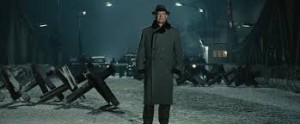 It is now autumn in America. This means that leaves are changing their colors and becoming richer and deeper in tone; that we are transitioning in time between the salad days of yore and winter’s cold meat of the future until we again reach spring when life sprouts once more anew; and that the youth of yesteryear is giving way to middle aged thoughtfulness.
It is now autumn in America. This means that leaves are changing their colors and becoming richer and deeper in tone; that we are transitioning in time between the salad days of yore and winter’s cold meat of the future until we again reach spring when life sprouts once more anew; and that the youth of yesteryear is giving way to middle aged thoughtfulness.
Yes, it’s a metaphor for the state of movies in the U.S. We have now departed the blockbuster summer where the most desirable demographic took center stage, to the more melancholic and self-contemplative movies that appeal more to the mature in us.
Now, there is one thing that should first be stated here, shouted from the rooftop in clarion clarity. This does not mean that the movies will be getting any better. No matter what people will claim, subject matter and weightiness is in no way a guarantee of quality.
In fact, I predict that you won’t be finding many American Hollywood films that will surpass Spies and The Martian.
But change is still upon us.
One of the reasons for this, though not the only reason, is that another name for the season we are now entering is called Oscar. It is the period when studios and major independents are releasing their prestige pictures in order to get as many nominations as they can, because if they don’t get nominations, then they can’t justify making movies about important subjects since they rarely make as much money as The Avengers or Captain America.
Normally, I might be shouting O frabjous day! Callooh! Callay!. And in fact, there are a number of the prestigers I am interested in seeing.
At the same time, it must always be remembered that the Academy Awards is the epitome of middle brow movie making. The films that make the list look good, sound important, give off the vibe that we should see them if we are to consider ourselves serious about film, and do to some degree indeed make you think.
But at the same time, none of these films rarely want to go too far. The filmmakers wish people to think they are creating important cinema that is the backbone of the art, when in reality, they are making movies that most of the time pretend to be taking a subject deathly serious and taking film in a forward direction, when in reality, they almost always let the audience off the hook and almost never really take them anywhere more uncomfortable than the cushioned seats the audience is seated in.
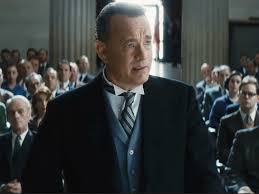 And with all that being said, we are off and running with Bridge of Spies, directed by Steven Spielberg and written by committee, Joel and Ethan Coen and Matt Charman, a film that in many ways epitomizes the epitome of middlebrow filmmaking.
And with all that being said, we are off and running with Bridge of Spies, directed by Steven Spielberg and written by committee, Joel and Ethan Coen and Matt Charman, a film that in many ways epitomizes the epitome of middlebrow filmmaking.
When Spielberg began, he was one of the most exciting new filmmakers around. Today, he’s the middle browest of the middle brow, rock solid movies whose main characteristics are how important they think they are, when in reality they have become so safe that a certain dullness has crept into them, like a bad series on Masterpiece Theater: to be respected, but if it wasn’t Masterpiece Theater, you can’t quite figure out why you’d be watching it.
I’m not sure what happened. There was a moment when it looked as if Spielberg might have actually found new life to his art. This was in 2005 when War of the Worlds and Munich were released.
Though I know many people don’t like his H.G. Wells adaptation, at the same time, I always felt it was underrated. A dark mirror image of his earlier films like E.T. and Close Encounters of the Third Kind, we now have aliens bent on destroying us rather than being our friends; and Spielberg filled it with incredibly horrifying imagery, some of it obviously inspired by 9/11.
In Munich, he dealt with a subject, a group of people trying to achieve revenge on behalf of a nation and failing miserably, on a level of cynicism I have never seen in his earlier works.
But after that we got Indiana Jones and the Kingdom of the Crystal Skull, The Adventures of Tintin, Warhorse and Lincoln, all of which had moments here and there, but all of which were incredibly safe and incredibly dull.
And Bridge of Spies is not much different, a cold war thriller about an important subject that is vague about what it has to say and has few thrills.
The basic premise of the movie revolves around one James B. Donovan, an insurance attorney who once had something minor to do with the Nuremburg Trials. Because of this, he is selected to defend Rudolf Abel, a Russian spy. Donovan takes it quite seriously, but Abel, though guilty, is railroaded through a show trial.
Donovan convinces the judge to not give Abel the death sentence in case at some time in the future the Russians capture an American spy and Abel can be used to get the spy back (the suggestion is that Donovan doesn’t believe in such an outcome, but it’s the only way he can keep his client alive).
But wouldn’t you know, as irony would have it, years later, American pilot Gary Powers is shot down over Russia while taking photos. And Donovan is asked to undergo negotiations. He’s asked because he’s a civilian and the U.S. government can’t be seen to be negotiating with the enemy and also because he knows Abel and also because the Russians (also not wanting to be seen as publically negotiating with the U.S.) reaches out surreptitiously to Donovan.
Wow, that’s a big set up (and that’s not the all of it, either; there’s another through line concerning an American student who gets caught in East Germany after the wall goes up) and it does point out one of the issues with the film: it takes forever to really get going. In fact, I would have to say that this movie has one of the longest, if not the longest, prologs of any movie I have ever seen.
I would strongly suspect that it’s not until more than a third of the movie has passed before Donovan gets that call to go to Germany and work to get Powers traded for Abel, which is when the story actually began.
So my sympathies are with the writers. I’m not sure how one could make this oddly shaped movie work.
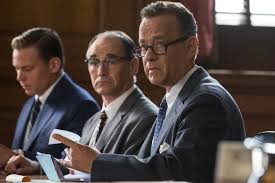 Still, the first half is very slow moving, to be polite, (and the scenes revolving around Gary Powers never really come alive) only redeemed by some fine bits of casting, especially that of Mark Rylance (Thomas Cromwell of Wolf Hall) as Abel, who gives a remarkably committed performance as the preternaturally calm Russian spy (when asked why he doesn’t get upset about something, he only responds, very evenly, by asking, “Would it help?”). He actually almost never does anything but sit there doing nothing, but you can’t take your eyes off of him and the intensity is riveting.
Still, the first half is very slow moving, to be polite, (and the scenes revolving around Gary Powers never really come alive) only redeemed by some fine bits of casting, especially that of Mark Rylance (Thomas Cromwell of Wolf Hall) as Abel, who gives a remarkably committed performance as the preternaturally calm Russian spy (when asked why he doesn’t get upset about something, he only responds, very evenly, by asking, “Would it help?”). He actually almost never does anything but sit there doing nothing, but you can’t take your eyes off of him and the intensity is riveting.
There’s also some good support from Alan Alda as Donovan’s boss and Jesse Plemmons as one of Power’s flying mates (Plemmons has one of the greatest faces in movies today; he just has to show up and it improves a movie).
Tom Hanks, who has made a number of films for Spielberg, of course, does his best to hold the whole movie together on his sturdy all-American shoulders, and it must be said, he does an excellent job all things considered. He attacks the role with all the common decency and moral rectitude of Gary Cooper in High Noon and Gregory Peck in To Kill a Mockingbird and gives a strongly ingratiating performance. He’s someone we all wish our fathers were.
He has difficulty doing much of anything for the first half which just drags along, though he is never boring himself. But when he goes to Germany, the movie changes, and the film becomes far more interesting and exciting. Finally, something is happening and the darkly comic cat and mouse game that Donovan plays with the Russians, the East Germans who have their own agenda, and the Americans themselves, is tense and thrilling.
Thematically, I find the film a little wobbly, possibly because I’m not quite certain I fully understand what Spielberg is up to here.
My immediate reaction is that it is the same theme for so many of his films, from Jaws to E.T. to Close Encounters… to Saving Private Ryan: the U.S.A. is great because of its middle-class which is made up of basically decent people who are willing to do whatever it needs to in order to get the job done. And here Donavan is the apotheosis of that decent middle class American.
But in some ways, Spielberg seems to be digging a little deeper. The time period is the late ‘50’s, ending in 1961. For many people, this is the real period of greatness of the U.S. We had just saved the world from one of the greatest evils mankind had ever seen and economically there was finally a chicken in every pot and car in every garage. For many looking back, it was almost an Eden on earth.
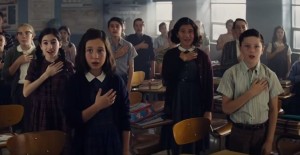 This is supported by Janusz Kaminski’s cinematography that makes every scene in the U.S. look like something out of a Norman Rockwell painting (Abel, an amateur artist, gives Donovan a gift, a portrait of the lawyer in the style of Rockwell’s JFK; and there is a scene that feels modelled after The Homecoming).
This is supported by Janusz Kaminski’s cinematography that makes every scene in the U.S. look like something out of a Norman Rockwell painting (Abel, an amateur artist, gives Donovan a gift, a portrait of the lawyer in the style of Rockwell’s JFK; and there is a scene that feels modelled after The Homecoming).
But when Donavan goes to East Berlin, we are now entering the Warsaw Ghetto of Spielberg’s Schindler’s List, where everything is becoming a hell on earth. At this point, everybody’s motives and morality, including America’s, becomes murky and self-serving. And it’s up to Donovan’s decency to save the day and American from itself.
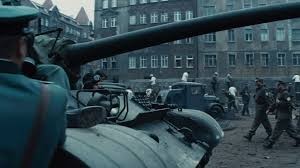 At the same time, he can’t save the future. And he watches as middle-class decency and old fashion American values start to give way to the often paranoid fears of the Cold War. So is Spielberg saying that the Abel/Powers is a loss of innocence and the beginning of the America we see today?
At the same time, he can’t save the future. And he watches as middle-class decency and old fashion American values start to give way to the often paranoid fears of the Cold War. So is Spielberg saying that the Abel/Powers is a loss of innocence and the beginning of the America we see today?
I have to be honest, it was a bit too vague to me, like Spielberg was committing to something without really committing to it. Maybe part of the problem is that it’s a theme and interpretation built upon nostalgia and I’m not sure that’s the best way to look at history.
I mean, I like Rockwell. No, I really do. There is something about his view of the U.S. that has an emotional core that seems sincere and can really be effective.
At the same time, I don’t take him seriously. Who can?
And I’m not sure I can take Spielberg’s view of this transition of the U.S. from innocent to the stain of original sin that seriously either. Yes, the 1950’s were great, if you were a white, straight, male who had never attended a party thrown by the friend of a friend of a Community sympathizer.
Of course, to be fair, if the first half hadn’t been so boring, maybe I wouldn’t have cared.
With Amy Ryan in one of those incredibly clichéd and thankless roles as the wife who can’t understand how important her husband’s work is and considers her own bourgeoisie existence far more important than anything else in the world; and Sebastian Koch (of The Lives of Others) in a very strong performance as the East German bureaucrat Wolfgang Vogel, who is desperate to get his country its due.












Cool. I spent a long time looking for relevant content and found that your article gave me new ideas, which is very helpful for my research. I think my thesis can be completed more smoothly. Thank you.
… [Trackback]
[…] Read More Information here to that Topic: rumblespoon.com/wp/2015/a-bridge-not-far-enough-steven-spielberg-tom-hanks-oscar-season-and-bridge-of-spies/ […]
… [Trackback]
[…] There you can find 65512 more Information on that Topic: rumblespoon.com/wp/2015/a-bridge-not-far-enough-steven-spielberg-tom-hanks-oscar-season-and-bridge-of-spies/ […]
Real superb info can be found on weblog.Raise blog range